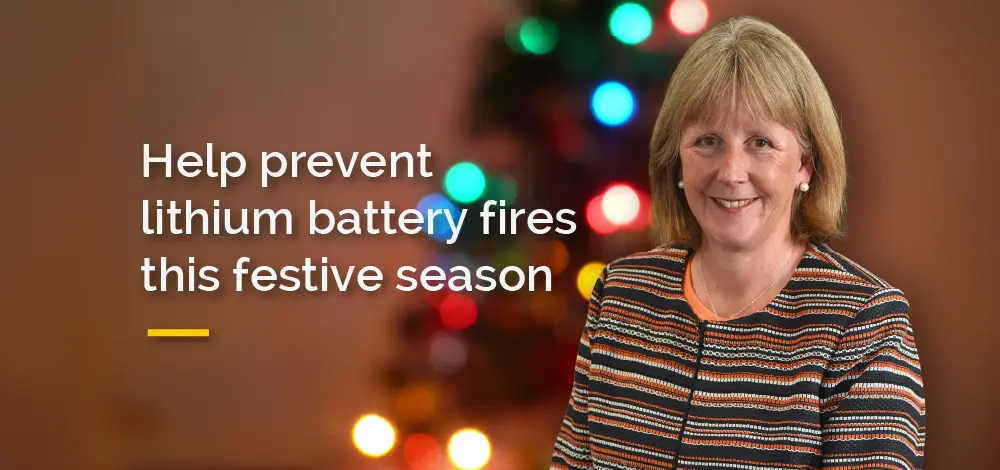Batteries become essential during the festive season, no electronic gift or light-up tree topper is complete without them. Last year, six billion batteries were thrown away, including over 1.1 billion electricals containing hidden lithium-ion batteries.
Notably, vaping has become increasingly popular across the UK, with an estimated 3.6 million Brits now using vapes. 20% opt for disposable vapes, which, like many festive decorations, rely on lithium batteries and contain various materials that pose recycling challenges.

The seasonal surge in battery usage can have serious consequences if they’re incorrectly disposed of in general waste or mixed recycling. So far in 2024, our Material Recovery Facilities (MRFs) recorded over 50 incidents caused by improper disposal of lithium batteries. These batteries can be crushed during processing, and some batteries, like lithium-ion, have the potential to explode or ignite, posing a severe risk to waste facility workers.
Toni Robinson, Risk & Sustainability Director, has observed these issues firsthand at our facilities. In this Q&A, Toni highlights the incidents caused by lithium batteries and emphasises the importance of safe disposal, offering clear guidance on how you can responsibly manage these items during the festive season and beyond.
1. What was the most notable lithium battery incidents at our facilities in 2024?
Every incident involving a lithium battery is notable in my view, as it has the potential to injure people and destroy equipment, infrastructure and buildings. On average, we have at least one fire every week due to a damaged lithium battery, this is a scary statistic and is not unique to just Grundon.
Grundon ensures all our facilities are equipped with fire detection and suppression systems, with employees being trained in their use, which helps to minimise the potential of any damage or loss.
The biggest risk is when our vehicles are out collecting waste, if batteries are contained within the waste or recycling, this can lead to a fire which poses a significant threat to our employees, as well as members of the public in the vicinity.
2. From your experience, what’s the biggest challenge in managing lithium battery disposal?
The biggest challenge for Grundon is spotting these batteries, as the majority are very small and are easily hidden amongst the waste and recycling we handle.
In an ideal world, everyone would be separating them, which then allows them to be handled in a safe manner. Unfortunately, too many people don’t appreciate the need to do this and often it’s not easy to do as the battery can be integrated into the design of the product. For example, vapes with internal batteries, are encased within the device and cannot be easily removed or replaced.
3. What advice would you give to people purchasing gadgets which contain lithium batteries?
When purchasing these items, think about the design of the product and whether it has been created for the long term or as a disposable item. Often these disposable items have batteries that can’t be replaced, so they’ll end up being thrown away. As a society, we need to think more sustainably and try to buy goods that last longer and have batteries that can be changed. This way, used batteries can be easily recycled.
4. What steps should businesses follow to dispose of lithium batteries safely?
This is easy. Ensure any batteries are separated so they can be sent for recycling – Grundon can help you with this by providing separate containers. This not only ensures that the batteries don’t cause any harm, but also means that valuable materials such as Lithium, Cobalt and Manganese can be recovered. If batteries are sent for recycling, then up to 95% can be recovered, which makes perfect sense.
5. Based on current trends, how do you see the future of lithium battery usage and disposal evolving?
The recent announcement from the government that disposable vapes will be banned from June 2025 is hopefully the start of legislation being put in place to help manage the situation. We need to hope that the Extended Producer Responsibility measures will ensure the true cost of putting these products onto the market and recycling them are covered.
How can Grundon help?
For businesses looking to navigate the complexities of lithium battery and electronic waste disposal, Grundon provides expert hazardous waste collection and disposal services. These services help you minimise your environmental impact by safely recycling and recovering valuable materials at our state-of-the-art facilities. We can provide a variety of UN-approved containers in different sizes, customised to accommodate your specific requirements.
This festive season, help prevent waste fires by correctly disposing of lithium batteries.
